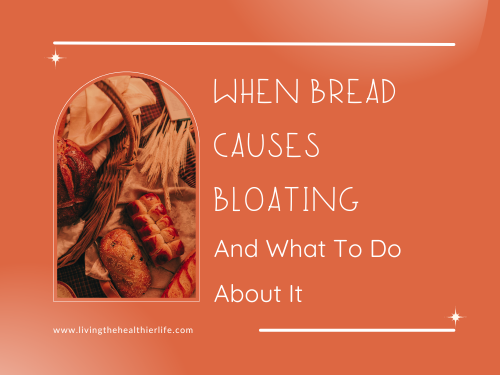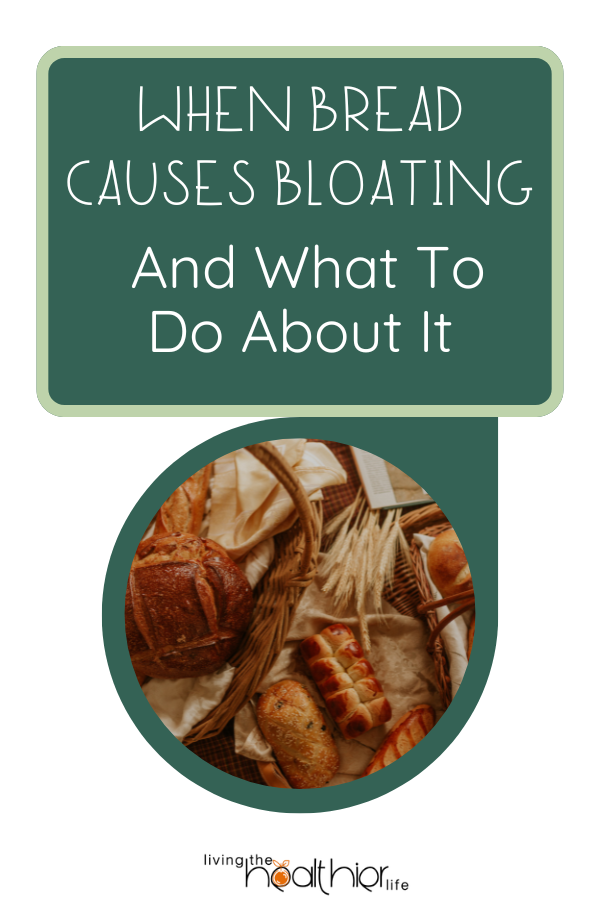Have you ever enjoyed a hearty sandwich or a piece of toast, only to feel uncomfortably bloated afterward? You’re not alone. For many, bread causes bloating, turning a simple meal into a source of discomfort. This common issue can leave you feeling puzzled and frustrated, especially if bread has always been a staple in your diet. Understanding why bread causes bloating can help you make informed choices and bring back the joy of eating without the unwanted side effects.


Radiant Plant-Based Living Starts Here
ShePlanted™: The Plant-Based Wellness Bundle for Women
250+ wholesome plant-based recipes + a mindset guide to help you feel confident, energized, and grounded — from your kitchen to your lifestyle.
Loved by 1283 women.
Why Does Bread Make You Bloated?
There’s nothing quite like enjoying a slice of warm, freshly baked bread. But if eating it often leaves you feeling bloated, you might wonder why.
One possible reason is a wheat allergy, which can cause uncomfortable reactions after consuming bread. Symptoms may include bloating, abdominal pain, or skin irritation. Exploring gluten-free alternatives could help alleviate your discomfort. These options exclude wheat and may be easier on your digestive system. It’s a good idea to consult a healthcare professional to determine the exact cause of your symptoms and receive appropriate guidance.
Understanding your body’s responses can help you make better dietary choices and improve your overall well-being. Everyone’s body is different, and what works for one person might not work for another. Paying attention to how you feel after eating certain foods can be a valuable step toward feeling your best.
Hidden Bloat Triggers in Bread
Though bread is a stable food for many of us, it does have the unfortunate side effect of triggering bloating. One common issue is the fermentation process in your digestive tract when gut bacteria break down components in bread. You might experience gas production and discomfort. Non-celiac gluten sensitivity could also be to blame. Common digestive symptoms include bloating and stomach cramps shortly after eating gluten-containing foods.
Even seemingly innocent ingredients, such as white flour, can cause trouble for those with sensitivities to refined wheat products. Paying attention to portion sizes and trying alternatives like sourdough bread, which is often easier to digest, might help. If bloating persists, consulting a professional can uncover the root cause and guide you toward dietary changes.
Is Gluten to Blame for Your Bloat?
Gluten is a protein that you can find in many types of bread, and it’s the gluten that’s the trigger for bloating.
For those with celiac disease, gluten actually starts to damage the lining of the small intestine. This can lead to digestive problems and symptoms like bloating, gas, and discomfort. For those who don’t have celiac disease, however, similar symptoms can be present due to non-coeliac gluten sensitivity. It creates similar digestive issues.
So, what should you do if you suspect gluten is the cause? One option is to switch to gluten-free bread to reduce symptoms. You can find these breads in the specialist food section of most big supermarkets or health food stores. As with other health advice, you should always consult your healthcare professional. They can run tests to see if gluten is an issue or whether there is another underlying cause.
Fiber in Bread: Friend or Foe?
Fiber in bread can be hugely beneficial, which is why granary or whole-grain bread today often tops the list for a healthy, fiber-rich diet. It keeps things moving in your digestive process and supports gut health. But for some, fiber isn’t always their friend.
If you have irritable bowel syndrome, that same fiber can lead to bloating or discomfort, making white bread seem like a better option. The trick is finding what works for your body. Start slow if fiber feels overwhelming, and pay attention to how your gut reacts. Bread doesn’t have to be an all-or-nothing choice—it’s about balance.
Spot the Signs of Bread Bloat
Bread bloat is a common experience for many people, but identifying it can be tricky. If you often feel uncomfortable after eating bread, it could be a sign of an underlying issue like wheat sensitivity or a reaction to fermentable oligosaccharides in the bread, which can cause excessive gas in the large intestine. Understanding the signs can help you determine if bread might be the cause of your discomfort. Signs include:
- Bloating and abdominal distension
- Excessive gas or frequent burping
- Stomach pain or cramps after eating
- Feeling overly full even after a small portion
- Digestive discomfort lasting several hours
If you notice these symptoms regularly, it may be time to evaluate your diet. Switching to a gluten-free diet or exploring other bread options might help. If symptoms persist, consulting a healthcare professional for an accurate diagnosis can uncover specific food intolerances or other health conditions causing your issues.
Bread Swaps to Beat the Bloat

There’s nothing quite like sinking your teeth into a warm slice of bread, but if it leaves you feeling bloated, it might be time to explore some delicious alternatives. The good news is that you don’t have to give up bread altogether to find relief. Sourdough bread, for example, undergoes a natural fermentation process that can make it easier to digest for some people. This process breaks down some of the gluten and sugars, potentially reducing bloating.
Gluten-free breads are another option worth trying, especially if you suspect gluten might be the culprit behind your discomfort. Bread made from ancient grains like spelled or rye can also be gentler on the stomach while still offering rich, hearty flavors. Even experimenting with bread that includes seeds and nuts can add nutritional benefits and might sit better with your system. Remember, everyone’s body is different, so don’t hesitate to sample a variety of breads to find the one that makes both your taste buds and your tummy happy.
Quick Fixes for Bread Bloating
Feeling bloated after enjoying your favorite loaf can be a real downer, but there are quick remedies that might help ease your discomfort. Sipping on herbal teas like peppermint or ginger can soothe your digestive system and reduce bloating. These teas are known for their ability to relax the gastrointestinal tract, helping to move things along. Light physical activity, such as taking a leisurely walk, can also stimulate digestion and alleviate that puffed-up feeling.
Paying attention to portion sizes can make a difference, too—sometimes enjoying smaller servings can prevent bloating before it starts. If you suspect certain ingredients in your bread are causing issues, consider opting for varieties with fewer additives or preservatives. Chewing your food thoroughly and eating slowly can help reduce the amount of air you swallow, which contributes to bloating. Small adjustments like these can have a significant impact on how you feel, so give them a try next time bloating strikes.
When to Worry About Bloating
Bloating is something most of us experience occasionally, especially after a big meal, but how do you know when it’s time to be concerned? If you notice that bloating is becoming a regular occurrence, regardless of what you eat, or if it’s accompanied by other symptoms like persistent stomach pain, unexplained weight loss, or changes in bowel habits, it might be wise to consult a healthcare professional. Conditions such as celiac disease, irritable bowel syndrome, or specific food intolerances could be underlying causes that need attention.
Don’t ignore symptoms that interfere with your daily life or cause significant discomfort. Seeking medical advice can lead to an accurate diagnosis and effective treatment plan, helping you get back to feeling your best. Remember, listening to your body is crucial, and reaching out for professional help is a proactive step toward better health. There’s no need to endure ongoing discomfort when solutions are available.
Conclusion: Bread Causes Bloating—What You Can Do
Recognizing that bread causes bloating is the first step toward finding relief. Whether it’s due to ingredients like gluten or high fiber content, identifying the cause empowers you to make changes. You might explore different types of bread, adjust portion sizes, or consult a healthcare professional for personalized advice. Don’t let bloating take away the pleasure of your favorite foods. With the right approach, you can address why bread causes bloating and enjoy your meals comfortably.
Pin This Post

